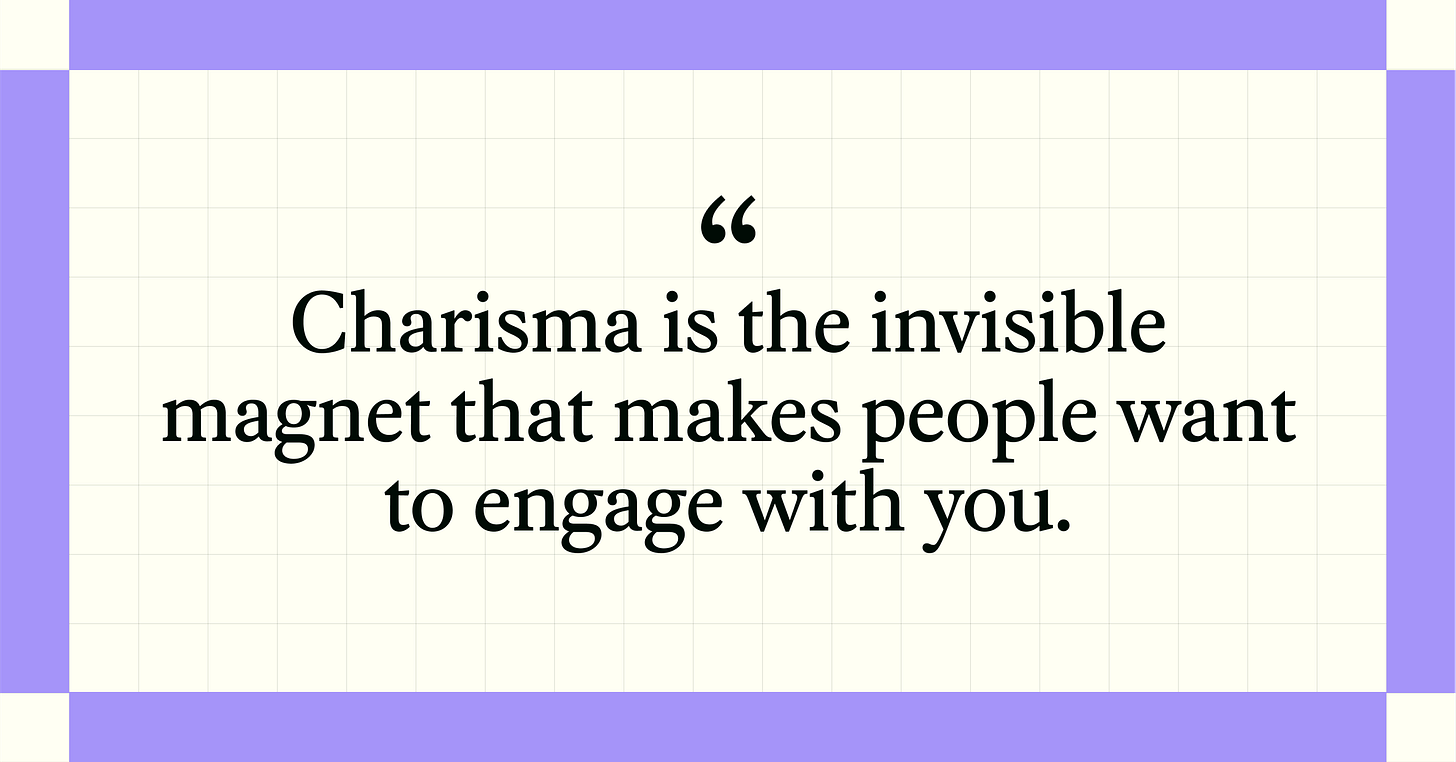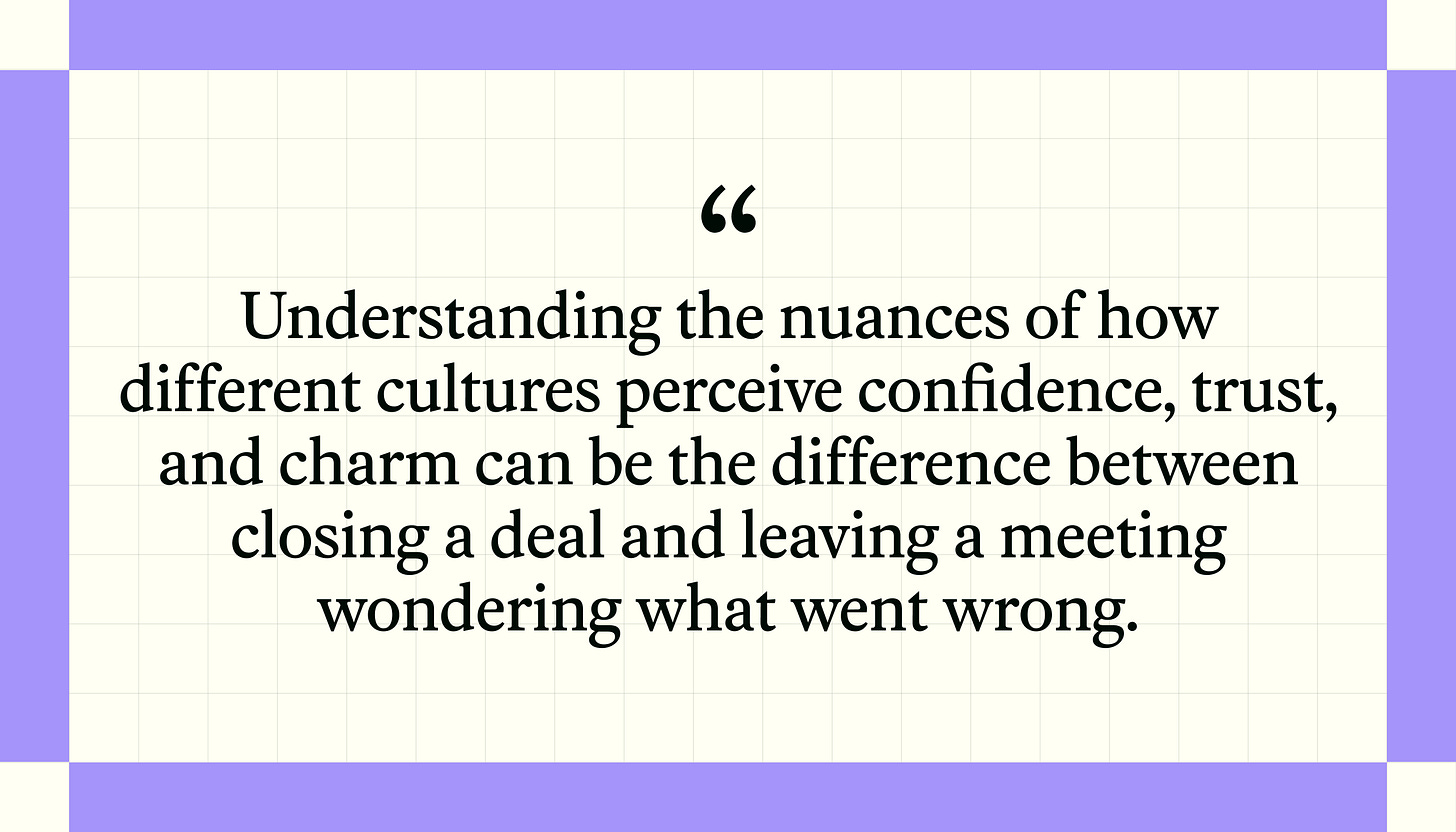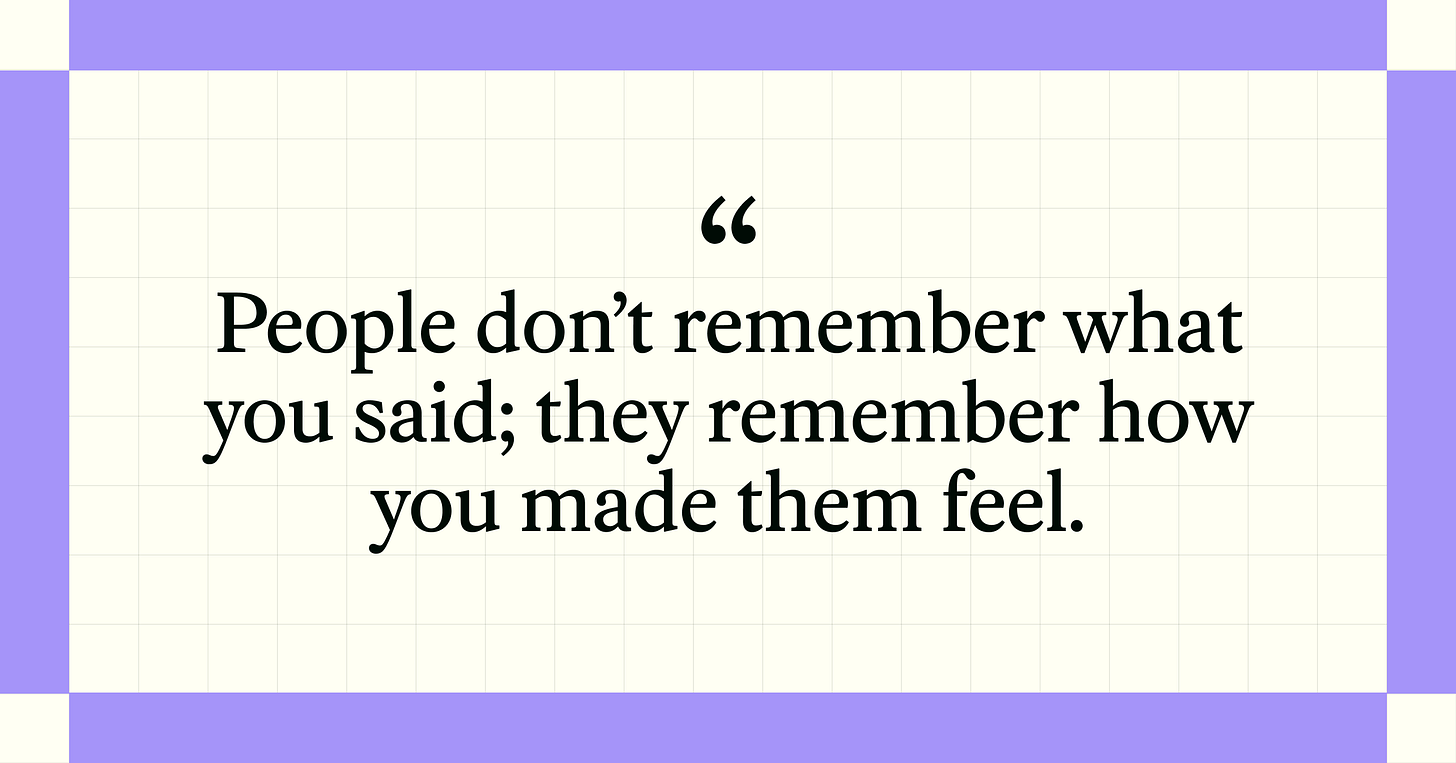Do You Need to Be Likeable to Succeed? The Truth About Charisma in Sales
People forget your words, but they never forget how you made them feel
A First Date Disaster: You turn up to a first date in a crumpled shirt, mumble your name, avoid eye contact, and check your phone mid-conversation. How’s that working out for you? Exactly, there’s no second date.
The Networking Black Hole: You meet someone at an event, they barely acknowledge your presence, give one-word answers, and stare at the nearest exit. Are you following up with them later? Didn’t think so.
The Clueless Shopkeeper: You walk into a store, ready to buy, and the shop assistant doesn’t even look up from their phone. You leave, take your money elsewhere, and never return.
What do all these points have in common? A complete lack of charisma. And if you think charisma is just a “nice to have,” think again. It’s the difference between someone wanting to work with you and someone forgetting who you are.
Can You Succeed Without Being Likeable?
Sure, technically. If your client needs what you sell so desperately that they’d buy it from an actual robot, you might get away with it. But is that really success? That’s not a business relationship, it’s a hostage situation.
Business isn’t just about finding customers; it’s about keeping them. And charisma is the secret weapon you didn’t know you needed.
“More charisma = More retention”.
What is Charisma?
Here’s my simplest definition:
At its core, charisma is about connection. It’s about making people feel seen, heard, and valued. And in the past, charm was considered magic. Honestly? It still is.
Now, before you start panicking, charisma is not something you’re either born with or doomed to live without. It’s a skill, just like sales. And just like sales, you can get better at it.
Charisma Across Cultures
Charisma isn’t a one-size-fits-all trait, it looks different depending on where you are in the world. In some cultures, being charismatic means being bold, expressive, and animated. In others, it’s about quiet confidence and measured responses.
For example, in the U.S., charisma is often associated with high energy, strong eye contact, and storytelling. In Japan, charisma leans more toward humility, active listening, and knowing when to pause. In Germany, directness and precision can be seen as charismatic, while in Latin America, warmth, physical touch (like a friendly pat on the back), and enthusiastic engagement make someone stand out.
So if you’re selling or networking internationally, charisma isn’t just about being likable, it’s about being culturally adaptable.
The Charisma Killers (And How to Fix Them)
1. Lack of Confidence = Lack of Trust
If you don't believe in yourself, why should anyone else? Confidence is contagious, but so is doubt.
Fix It: Even if you're faking it till you make it, act like someone worth believing in. Stand tall, speak clearly, and make eye contact. In sales (and life), perception is reality.
"For charisma, your body language matters far more than your words do."
— Olivia Fox Cabane, The Charisma Myth
2. Splitting Your Attention = Killing Your Presence
Nothing drains charisma faster than someone who isn't fully present. We've all felt the disconnect when talking to someone who's mentally elsewhere, checking their phone, scanning the room, or thinking about lunch. It's off-putting.
Fix It: When you're in a conversation, be all in. Make the other person feel like the most important person in the world at that moment. That's charisma; that's connection.
"When you exhibit presence, those around you feel listened to, respected, and valued."
— Vanessa Van Edwards, Captivate
3. Cold, Robotic, and Emotionless = Forgettable and Replaceable
Can a cold, distant person be charismatic? Not a chance. No one wants to work with (or buy from) someone who lacks warmth. Efficiency is great, but if you perform your job like a robot, people will treat you like one - replaceable.
Fix It: A simple smile, genuine curiosity, and showing you actually care go a long way. People don't just want to work with the best; they want to work with people they like.
"You can make more friends in two months by becoming interested in other people than you can in two years by trying to get other people interested in you."
— Dale Carnegie, How to Win Friends and Influence People
4. Engaging in Negative Gossip = Damaging Your Own Reputation
Participating in negative gossip can backfire, leading others to associate those negative traits with you.
Fix It: Avoid speaking negatively about others. Focus on positive or neutral topics to build trust and maintain a good reputation.
"Engaging in negative gossip means you also run the risk of having all of those negative traits you're gossiping about unconsciously linked with you!"
— Pete Sapper
5. Failing to Remember Names = Missing Personal Connections
Not remembering someone's name can make them feel unimportant, hindering the development of a personal connection.
Fix It: Make a conscious effort to remember and use people's names in conversation. This small gesture can significantly enhance rapport.
"A person's name is to that person the sweetest sound in any language."
— Dale Carnegie, How to Win Friends and Influence People
And definitely do not remember names like this:
Michael's Name Mnemonic Device | The Office (US)
6. Monotone Voice = Lack of Engagement
A monotonous voice can drain the life out of a conversation, making even the most interesting topics feel dull. People naturally respond to vocal variety, changes in pitch, speed, and emphasis keep them engaged.
Fix It: Practice modulating your tone to convey enthusiasm and sincerity. Use strategic pauses for emphasis and let your voice reflect your emotions. A confident and expressive voice makes people more likely to pay attention to you.
"A powerful voice is a key indicator of presence and confidence."
— Amy Cuddy, Presence
7. Over-Apologising = Undermining Your Authority
Apologising too frequently, especially when unnecessary, can make you appear less confident and diminish your credibility.
Fix It: Reserve apologies for when they are truly needed. Instead, reframe your language with confidence.
"People respect those who own their words and actions with confidence."
— Vanessa Van Edwards, Cues
8. Talking Too Much = Losing Engagement
Dominating conversations without allowing others to contribute makes interactions feel one-sided and draining.
Fix It: Listen more than you speak. Practice active listening by pausing, nodding, and allowing space for the other person.
"A great conversationalist makes the other person feel like the most interesting person in the room."
— Dale Carnegie, How to Win Friends and Influence People
Helpful Reading
For those looking to develop their charisma further, here are some top recommended books:
The Charisma Myth – Olivia Fox Cabane
Explores the three components of charisma: presence, power, and warmth, with exercises to improve each.How to Win Friends and Influence People – Dale Carnegie
A timeless classic on making people feel valued and appreciated.Captivate: The Science of Succeeding with People – Vanessa Van Edwards
Uses behavioral science to break down charisma into actionable strategies.Presence – Amy Cuddy
Focuses on body language, confidence, and how small physical changes can influence perception.Cues: Master the Secret Language of Charismatic Communication – Vanessa Van Edwards
Analyses the non-verbal signals that make someone appear naturally charismatic.
Charisma in Action: What I’ve Learned from Friends
I’ve seen charisma take many different forms, and it’s one of the biggest reasons I know it’s not just about being loud or extroverted, it’s about how you make people feel.
Take my good friend Ross Golightly (LinkedIn). He’s always the best-dressed person in the room. It’s not just about looking sharp, it’s the way he carries himself. His attention to detail, from his suit to his shoes, creates an aura of trust and confidence. That matched with his expert preparation makes you immediately feel like he knows what he’s doing, and you want to hear more about his work.
Then there’s Cristobal Alonso (LinkedIn). Agree to meet him for a casual coffee, and by the time you leave, his energy and passion have convinced you to start a business together. He doesn’t just talk, he radiates belief in what he’s saying, and that belief is infectious.
And then there’s Alexandra Balkova (LinkedIn). She’s intense. The kind of person whose seriousness might intimidate you at first. But then, just as you’re bracing yourself for a grilling, she cracks a joke with such perfect timing that you find yourself laughing at anything she says. She balances intensity with warmth in a way that makes you respect her even more.
These three people show me that charisma isn’t one thing, it’s not just confidence, energy, or humor. It’s about how you bring those things together in a way that makes people want to be around you, learn from you, and work with you.
People don’t remember what you said; they remember how you made them feel. Charisma is what makes a client choose you over a cheaper competitor, a colleague backing your crazy idea, and a stranger deciding they want to grab coffee with you instead of ghosting your message.
The good news? Charisma isn’t some mystical force you’re born with. It’s a skill, one you can practice, refine, and get better at every day. Show up, be present, and actually care about the people you’re talking to.
Because in sales, leadership, and life, people don’t buy products or services they buy into people. And if you’ve got charisma, they’ll buy into you.







